- Gift Launches Transformative Neurological Care
- A Simple Fix Helps Families with Special Needs
- Breakthrough Stroke Care at Indian River Reaches a Milestone
- Former Teacher Supports Aspiring Physicians at Cleveland Clinic Weston Hospital
- Researcher Honored with Achievement Award for Discoveries in Prostate Cancer
Gift Launches Transformative Neurological Care
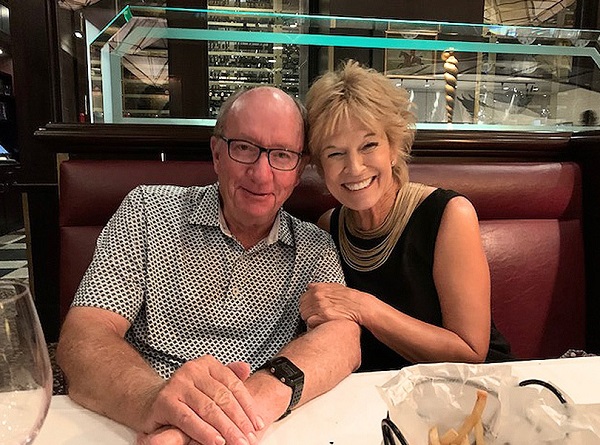
A Cleveland Clinic study, powered by ingenuity, expertise and philanthropy, has the potential to change the treatment of brain disorders.
Now in its initial stages, the Cleveland Clinic Brain Study promises to do for neurological health what the Framingham Heart Study, which began in the late 1940s, did for cardiovascular health.
Because of that earlier study, the relatively small city of Framingham, Mass., “became the main source of cardiovascular knowledge,” says Andre Machado, MD, PhD, Chairman of the Neurological Institute. “Much of what we know today about what’s good for the heart, what’s bad for the heart, came from that study.”
Dr. Machado envisions the Cleveland Clinic Brain Study making Cleveland, Ohio, the epicenter of neurological care.
“Just like in Framingham, where hundreds of patients were recruited and followed for a substantial amount of time to unveil what happens in the heart, we will follow a large cohort of individuals to unveil what happens in the brain in the very early phases of neurological disorder.”
A Challenge to Overcome
A key problem in neuroscience is to know which individuals in the general population are likely to develop symptomatic neurodegeneration in the short-term and mid-term. This will be a key goal of the Cleveland Clinic Brain Study. “Today, nobody knows that,” Dr. Machado says. “What we propose is a longitudinal study with frequent multi-modality measures to help figure that out. If we learn how to predict the occurrence of disease, we will be well positioned to investigate early therapeutics and bend the curve of neurodegeneration.”
He calls this “a window of opportunity” of neuroscience. “It’s going to be less difficult to develop treatments that prevent or slow down brain loss than to come up with a treatment that will regenerate the brain."
And, Dr. Machado emphasizes, “we can do this.” The Neurological Institute already has put philanthropic dollars to work getting regulatory approval and other early stages of the study underway.
Dr. Machado, who holds the Charles and Christine Carroll Family Endowed Chair in Functional Neurosurgery, credits the Carroll family for launching the Brain Study with a $3 million gift last summer. The Carrolls are supporting the portion of the study focusing on Parkinson’s characterization, which aims to achieve a more personalized treatment approach for each patient.
Commitment to Parkinson’s Research
Former Ohioans, the Carrolls moved to Charlotte, N.C., three years ago. They frequently travel back to Mrs. Carroll’s home state for Mr. Carroll’s healthcare visits. He is treated at Cleveland Clinic for Parkinson’s disease and sees other providers as well.
Mrs. Carroll says that she and her husband appreciate Dr. Machado’s “enthusiasm and excitement” about his research into Parkinson’s. “All you have to do is sit down with him to be quite impressed.”
They gave to the Cleveland Clinic Brain Study, which Dr. Machado is leading, because of the potential for effective treatment that’s adapted to each patient. “That’s really what I liked when Dr. Machado presented it to us — that individual, one-size-does-not-fit-all approach,” Mrs. Carroll says. “Just hearing Dr. Machado talk about it revs you up. It really is exciting research, and we’re quite pleased to be able to contribute to that.”
The Carrolls’ support of the Neurological Institute, including their endowed chair and an earlier gift to the institute’s Advanced Deep Brain Stimulation Research, stems from personal experience with neurodegenerative disease. “My mother died of ALS,” Mrs. Carroll says. “And we have many, many, many friends with Parkinson’s now, and it seems there hasn’t been much change for neurological disorders in a lot of years.”
Also, she says, “we strongly believe in the Cleveland Clinic and in Dr. Machado and his team.”
Ambitious — and Doable
Dr. Machado says that the Brain Study will include measuring the cognitive and overall function of a thousand or more patients using sophisticated electronic tools that were developed by engineers within the Neurological Institute.
“It’s a very ambitious study, and we understand the enormity of what we’re proposing,” he says. “On the other hand, we as a team think it’s very doable.”
He ticks off three reasons why, including Cleveland Clinic’s enormous patient population and the Neurological Institute’s in-house scientists who have the expertise to do this.
The third reason is the philanthropic support of individuals such as Mr. and Mrs. Carroll who provide the necessary resources for groundbreaking science.
How You Can Help
The Cleveland Clinic Brain Study is an enormous undertaking that requires additional philanthropic support to effectively change the course of disease progression in patients at risk for neurodegenerative diseases. Please make a gift to support this critical brain health research.
A Simple Fix Helps Families with Special Needs
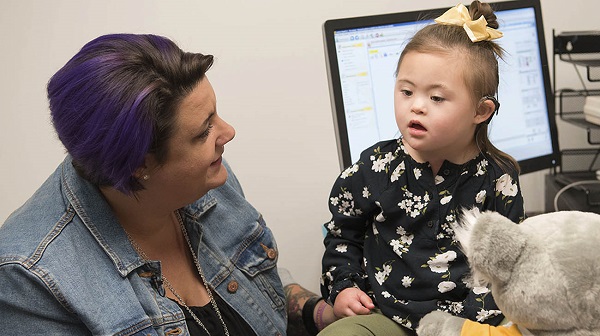
Cleveland Clinic Children’s took note and opened the Center for Down Syndrome in April 2019. The multi-disciplinary clinic offers four specialties – pediatric neurology, developmental pediatrics, therapy services and social work. The family remains in one location while the specialists come to them – a simple, yet transformational improvement to care.
Michael B. Petras, Jr, a member of Cleveland Clinic’s Board of Directors, and his wife Melanie, saw a way they could help families of children with special needs and made a generous gift to help fund the clinic. As parents of a daughter with Down syndrome, the Petras’ knew firsthand how hard it could be to orchestrate multiple medical appointments.
“Helping to ease a family’s visit to the doctor aligns with Cleveland Clinic’s guiding principal of ‘Patients First,’ says Michael. “We knew from our own experiences that this could be a game-changer.”
Their support funds the social work position for the clinic, held by Meghan McLaughlin, Outpatient Therapy Services Social Worker. “It’s just a great bridge between the clinic and the outpatient services,” McLaughlin says about the clinic. “Being able to meet with four specialists at one time instead of having to make four separate appointments is such a time – and sanity – saver for parents.”
Led by pediatric neurologist Sumit Parikh, MD, the clinic staff works with Cleveland Clinic Fetal Care Coordinators and Neonatal staff to help with program awareness and outreach efforts to the Northeast Ohio region. In addition to the four specialists, other disciplines such as endocrinology, cardiology and nutrition are available for consult.
McLaughlin notes that the program also is evolving to better serve families. “We realized that infants are fine with four-hour appointments but that time frame can be way too long for toddlers and young children,” she says. “We’re now working to streamline the length of our clinic visits, for example, by having paperwork filled out prior to the appointment.”
How You Can Help: At Cleveland Clinic Children’s, we believe that every one of us has the power to make a difference — we hope you will join us in rising to the challenge. Make a gift today to support patient care and groundbreaking research.
Breakthrough Stroke Care at Indian River Reaches a Milestone
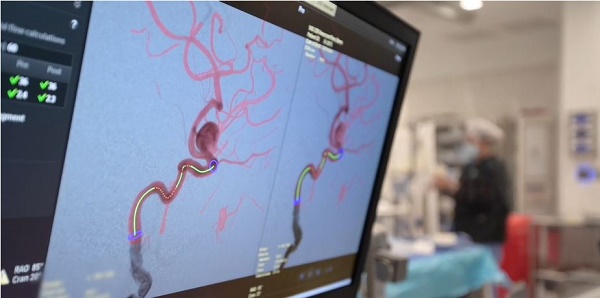
In early 2020, the opening of the Scully Interventional Neurology Suite at Cleveland Clinic Indian River Hospital addressed the growing stroke care needs of the community. One year later, the stroke program is delivering breakthrough, life-saving care with resources provided by philanthropy.
Surpassing the $10.5 million fundraising goal in just nine months, philanthropic support from the community expanded technology and capacity for the stroke program.
“Through the generosity of the Cleveland Clinic Indian River Foundation and the wonderful people who have supported our stroke program, Cleveland Clinic Indian River has some of the most advanced neuroimaging and interventional neurology equipment in the world,” says Brett Waress, Director of Operations at Indian River Hospital. “Truly life-saving care, right here in Vero Beach, provided by our donors.”
The hospital receives over 600 acute stoke alerts each year. Every minute counts to optimize life-saving outcomes, as stroke is the nation’s fifth leading cause of death, and one of the most common causes of serious, long-term disability in the U.S.
100th Mechanical Thrombectomy
The neuro-interventionalist team at Indian River Hospital provides advanced treatment for ischemic strokes using a procedure known as mechanical thrombectomy, which has revolutionized stroke care in the United States. An ischemic stroke is caused by a blood clot that blocks the flow of blood to portions of the brain; nearly 87% of strokes are ischemic.
Mechanical thrombectomy, which can be used to treat even the most severe cases, uses a catheter to reach the blockage and then entangles the clot in a wire mesh stent for removal. While mechanical thrombectomy is not an option for all patients, and each patient’s recovery is individualized, research clearly indicates the procedure has positive results for one in three patients if treated within 24 hours. This dramatically increases a patient’s chances of returning to his or her pre-stroke condition following the procedure.
This past March, the neuro-interventionalist team performed its 100th mechanical thrombectomy procedure in the Scully Interventional Neurology Suite.
“The 100th thrombectomy performed at Indian River hospital is an important milestone,” says Badih Adada, MD, Institute Chair for the Neurology Institute at Cleveland Clinic Florida. “It’s a measure of how we are meeting the stroke care needs of the community by providing the most advanced treatments available today and achieving the best possible outcomes. Thanks to the support of philanthropy, we are giving patients an opportunity for a complete recovery, and avoiding the devastating disability that can be caused by a stroke.”
Cleveland Clinic Indian River Hospital has developed protocols to streamline and expedite the care of stroke patients, including an evaluation and treatment protocol with a clot-busting drug called tPA, which is administered within three hours of first symptoms for applicable patients. This medication has been used for many years as a treatment for heart attack and has now been found to save lives and decrease disability for certain types of stroke.
The tPA medication was administered to the recipient of the 100th thrombectomy procedure. The patient arrived at the Emergency Department within an hour of having stroke symptoms.
In a seamless process, the patient received the tPA medication less than 25 minutes after arrival, was taken to the intervention suite for the thrombectomy and was later discharged home without any challenges. The patient continues to make a full recovery.
How You Can Help
Lorne R. Waxlax was one of the first donors to give $1 million to the Campaign for Comprehensive Stroke Care. He inspired others to support the campaign and help meet the goal in record time.
“It is important to give where we live and to help the community have needed services that can save lives,” says Mr. Waxlax.
Philanthropic support of Cleveland Clinic Florida’s neurology programs funds innovations that save lives. Your gift has the power to make an impact today and tomorrow. Please make a gift today.
Former Teacher Supports Aspiring Physicians at Cleveland Clinic Weston Hospital
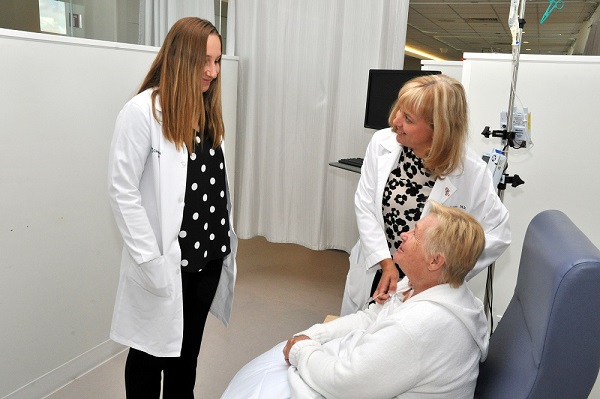
As a former elementary teacher and administrator, Pam Holmes understands the power of education.
Now retired after 30 years in the profession, Pam still has an unwavering belief in education and its benefits.
After spending six days in the hospital at Cleveland Clinic Weston Hospital, she was so impressed with the expert level of care she received that she made a donation to its Summer Scholar Program for young aspiring physicians.
The Summer Scholar Program, led by Dana Sands, MD, colorectal surgeon at Cleveland Clinic Weston Hospital, is designed for high school seniors and college undergraduates who want to become physicians. The program introduces students to clinical medicine and teaches them about the daily tasks and responsibilities of a physician, offering a real-world hospital experience.
Students are exposed to many clinical and hospital areas including Internal Medicine, Radiology, Emergency Medicine and Surgery. The experience culminates at graduation with students giving presentations about diagnoses or cases that intrigued them or made an impact.
Exemplary Patient Care
“Dr. Sands is my hero and a wonderful physician. She went above and beyond for me and thought outside of the box for my surgery. I appreciate that she explained everything along the way, as did the other physicians involved with my care,” Pam says. “Every staff member I encountered was fabulous, from the nurses to housekeeping. Everyone was so gracious and couldn't do enough for me. And given we are still in a pandemic, the level of attention and professionalism made my experience second to none.”
After her successful surgery, Pam, who believes strongly in philanthropic giving, wanted to show appreciation by supporting a cause or initiative that’s important to Dr. Sands.
“When Dr. Sands suggested I could support the Summer Scholar Program, I felt my experience had come full circle. Since I was an educator for 30 years, this was the perfect way to show my gratitude. I think the program provides great opportunities for students to get hands-on experience at a world-class facility.”
The Summer Scholar Program was founded by Dr. Sands in 2006. Each year, around 60 students are enrolled in the program.
“The summer scholar program has been running annually for nearly 15 years,” says Dr. Sands. “It has been made possible by generous donations from grateful patients. I am so humbled by Pam’s generosity. This gift ensures that we can continue to inspire the next generation of physicians here at Cleveland Clinic Florida.”
“On a scale of one to 10 with 10 being the highest, my experience at Cleveland Clinic Weston Hospital was a 10,” says Pam. “Dr. Sands fostered a relationship that made me feel like she was my best friend.”
How You Can Make an Impact
Gifts of all sizes help Cleveland Clinic Florida educate tomorrow’s physicians. Please make a gift today.
Researcher Honored with Achievement Award for Discoveries in Prostate Cancer
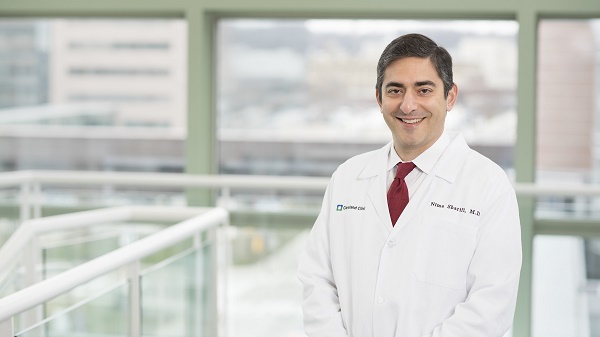
Nima Sharifi, MD, has received the 2021 Waun Ki Hong Award for Outstanding Achievement in Translational and Clinical Cancer Research from the prestigious American Association for Cancer Research (AACR).
The award—established to celebrate the achievements of the late Dr. Hong, whose own research advanced the field of targeted chancer therapy and launched chemoprevention—recognizes early- and mid-career scientists for extraordinary contributions to the field of cancer research. Dr. Sharifi, who directs Cleveland Clinic’s Genitourinary Malignancies Research Center, was selected for his work into how a genetic variant enables prostate cancer cells to evade first-line treatment and leads to aggressive disease.
“I am incredibly honored to receive the AACR Waun Ki Hong Award,” said Dr. Sharifi. “Dr. Hong’s practice-changing discoveries represent the gold standard for medical oncologists and cancer researchers everywhere who strive to find solutions in the lab for real-world problems faced by patients and clinicians.”
With the award, AACR recognizes Dr. Sharifi for his paradigm-shifting discovery that the HSD3B1(1245C) variant helps prostate cancer cells to produce their own androgens—hormones that act like fuel—thereby allowing the cancer cells to dodge the effects of androgen deprivation therapy, which is part of the standard-of-care, first-line prostate cancer treatment.
Since publishing this research in Cell in 2013, Dr. Sharifi has gone on to show in several studies reported in Lancet Oncology and JAMA Oncology that in men with low-volume advanced prostate cancer, the genetic variant is associated with faster progression to treatment resistance and shorter overall survival. In 2020, he and his team reported in JAMA Oncology results from the first clinical trial validation of the relationship between HSD3B1 status and clinical outcomes.
The findings importantly suggest that genetic testing for the presence of HSD3B1(1245C) may help physicians identify those patients most likely to benefit from additional and more aggressive treatment. With funding from the Department of Defense, Dr. Sharifi is currently working with collaborators to develop a prostate cancer drug that targets the metabolic enzyme produced by the 1245C variant.
“Nima is tremendously deserving of this prestigious recognition from the American Association for Cancer Research. His research into the role of the HSD3B1 gene variant has evolved into a nearly decade-long story of translation success,” said Eric Klein, MD, chairman of Cleveland Clinic’s Glickman Urological & Kidney Institute, and Dr. Sharifi’s close clinical collaborator. “His work truly spans the entire research continuum—having moved from bench to bedside and back again—and honors the spirit of Dr. Hong’s commitment to cancer research translation.”
The Waun Ki Hong Award for Outstanding Achievement in Translational and Clinical Research will be presented to Dr. Sharifi at AACR’s Annual Meeting in April and May, which will be help virtually this year. Dr. Sharifi is the fifth recipient of the award, which was created and presented for the first time in 2017.
AACR is made up of nearly 50,000 researchers, physician-scientists, other health care professionals and patient advocates from around the country working to fight cancer. “This award is especially meaningful as I was selected by an organization of my peers,” said Dr. Sharifi. “I’m humbled by the recognition and look forward to continuing the line of investigation to hopefully bring more care-enhancing discoveries to patients.”
Dr. Sharifi is a staff member in the Department of Cancer Biology and holds the Kendrick Family Chair for Prostate Cancer Research at Cleveland Clinic. He also has joint appointments in the Glickman Urological & Kidney Institute and Taussig Cancer Institute. In 2017, Dr. Sharifi received the national Top Ten Clinical Achievement Award from the Clinical Research Forum for his discoveries related to HSD3B1.
Article originally posted on Lerner Research Institute News

